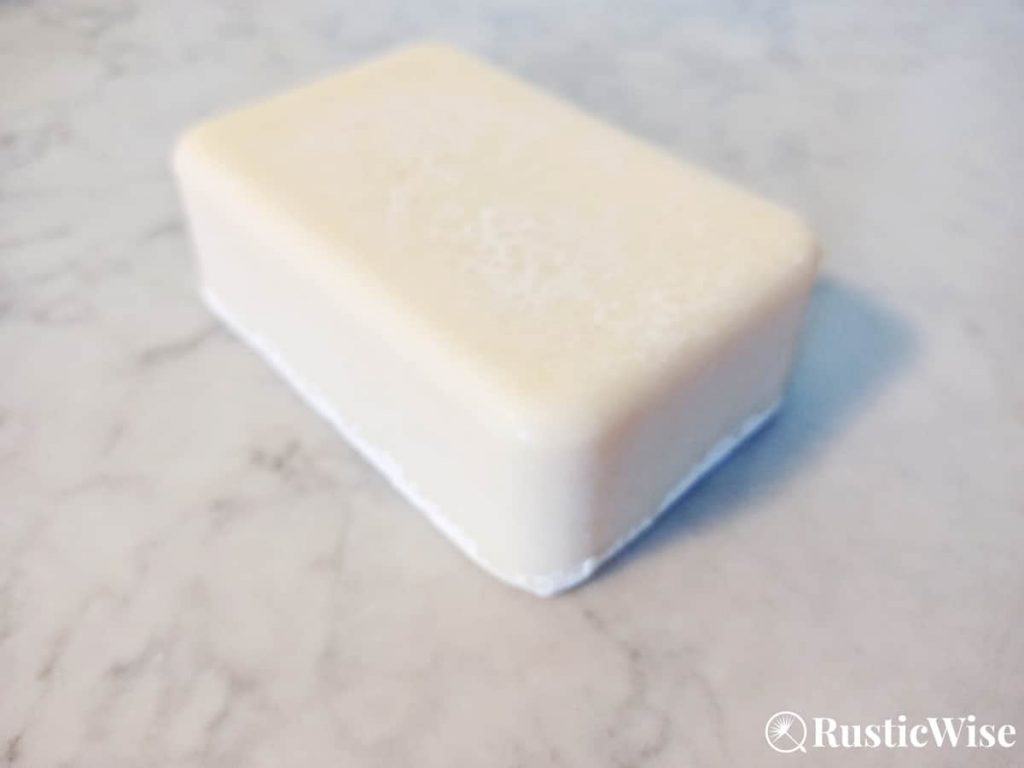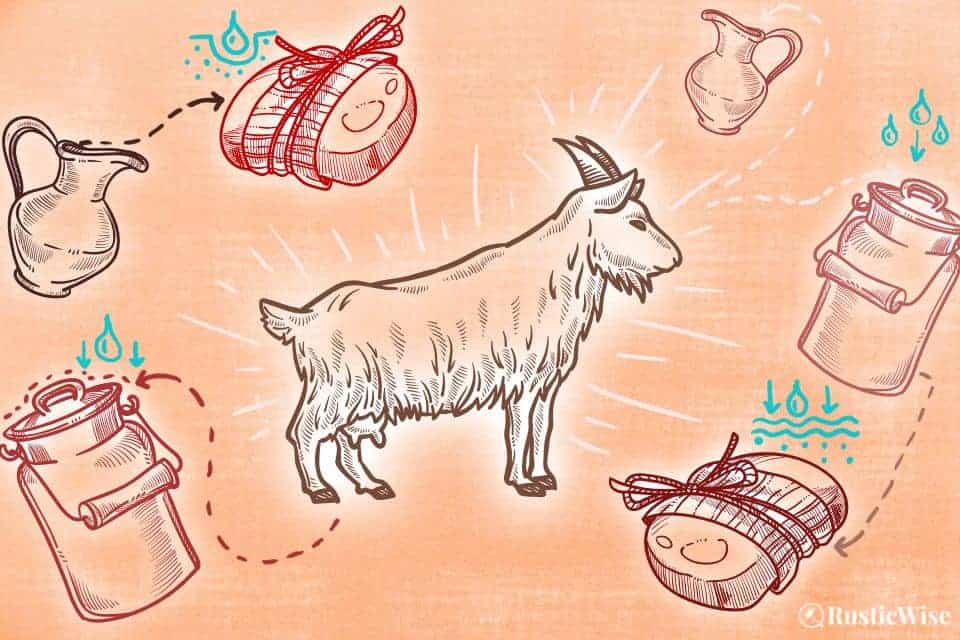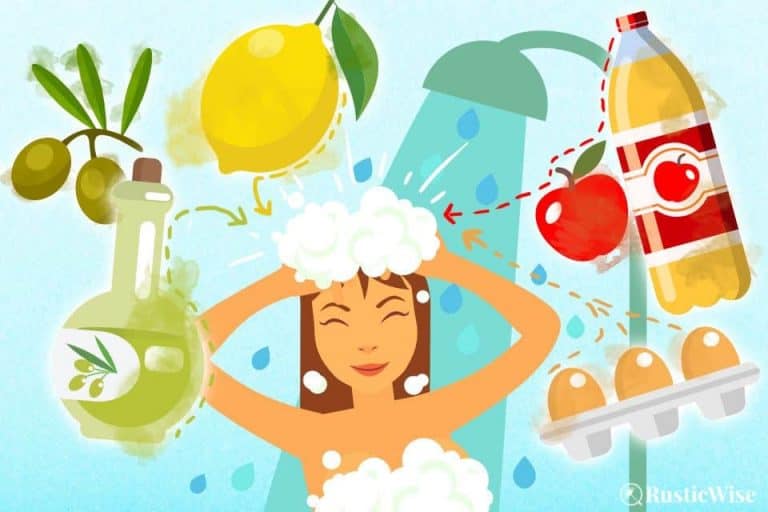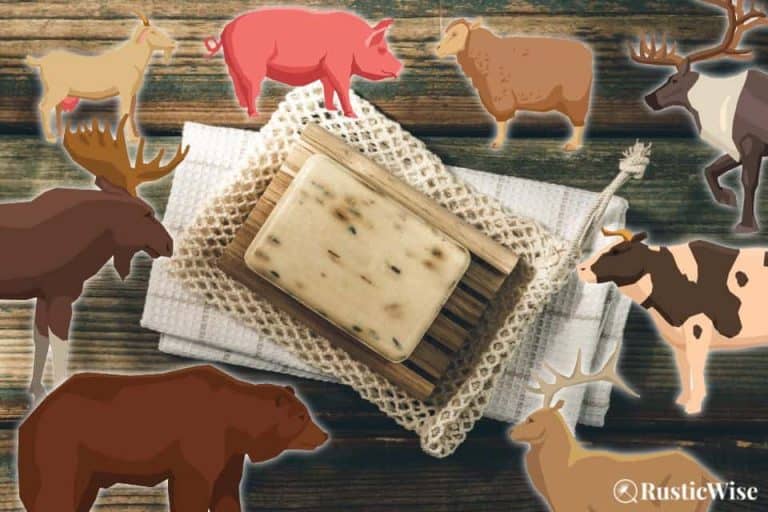8 Benefits of Goat Milk Soap and 2 Disadvantages
RusticWise is supported by its readers. When you purchase through links on our site, we may earn an affiliate commission. As an Amazon Associate, we earn from qualifying purchases. Thank You!
Nourishing and easy to digest, many prefer goat’s milk over cow’s milk as it’s easier to digest. Not only is goat milk healthy for the body when ingested, it also provides plenty of benefits for skin when applied topically.
One of the easiest ways to incorporate this creamy milk into your skincare routine is to use a bar of goat milk soap. What exactly are the benefits of goat milk soap? Rich in vitamins and minerals, goat milk soap contains lactic acid which removes dead skin cells resulting in a healthy glow. It’s also creamy and moisturizing—great for dry or sensitive skin!
While there are a plethora of advantages to using goat milk in soap, we’ll also reveal some disadvantages of goat milk soap below.
A closer look at goat’s milk soap
Most goat’s milk soaps on the market today are made using cold process soap making methods with basic, natural ingredients. (In other words, you get a bar of traditional, homemade soap!) Milk from goats is an ideal soap making additive as it’s high in fat, which makes for a luxurious and creamy finished product.
Did you know that most of the commercial soaps you’ll find at the store are not “real soap” but made of synthetic detergents?
The U.S. Food and Drug Administration (FDA) defines real soap as something mostly composed of the “alkali salts of fatty acids.” This is made by combing a strong alkali (sodium hydroxide lye or potassium hydroxide lye) with fats (vegetable oils or animal fats).¹
Don’t worry—the finished product doesn’t contain any active lye!
While the recipe for bar soap varies from bar to bar, most contain:
- Vegetable oils (such as olive oil, coconut oil, shea butter, or palm oil) and/or animal fats (such as lard or tallow)
- Distilled water
- Goat’s milk
- Any other additives (such as oats or botanicals), colorants, or essential oils/fragrances

Credit: Vector State
Can you use goat milk soap on face?
Yes, goat’s milk soap is safe and gentle enough for your face. Like other soaps, take care not to get any in your eyes (although some people say this type of soap doesn’t sting as badly as other soaps!).
Is goat milk soap good for your skin?
Absolutely! Goat milk soap is known for its many benefits for the skin. It’s rich in alpha-hydroxy acids, vitamins, and minerals that can help nourish and moisturize the skin. The lactic acid in goat’s milk can also help exfoliate dead skin cells, leaving the skin smoother and brighter.
Plus, goat milk contains natural fats that can help protect the skin from damage and promote healing. Gentle on the skin (no matter your skin type), it can be a great alternative for those with sensitive skin or experience skin irritation to traditional soap ingredients. Overall, there are plenty of goat milk soap benefits for skin and it can be a great addition to a skincare routine.
8 Benefits of goat milk soap
There’s a reason this handcrafted cleanser is soaring in popularity. Many consumers and DIYers are looking for natural alternatives containing simple ingredients, and goat’s milk soap fits the bill.
Let’s take a closer look at this natural ingredient and the many benefits of goat milk soap:
- Rich in vitamins, minerals, and amino acids.
- Creamy and moisturizing.
- Gentle, yet effective.
- Brightens skin tone for a healthy glow.
- May fight signs of aging.
- May help with acne and other skin conditions.
- Soothes skin.
- Free of harsh surfactants.
You might like
Legend’s Creek Farm Goat Milk Soap Sweetwater
- Made using 100% natural, organic ingredients. Contains no harsh chemicals, parabens, sulfates, fillers or other irritants.
- Certified cruelty free.
- Goat milk contains fatty acids and probiotics that hydrate your skin and support your skin’s microbiome.
Found on Amazon
Check Current Price
Those in Canada and the UK should be taken to the product listing in your region.
1. Rich in vitamins, minerals, and amino acids
Just as this creamy liquid provides nourishment for the body, it also contains many skin-loving properties for skin.
Here’s a look at the main constituents found in goat milk:²
- Vitamin A: Goat milk contains more vitamin A than cow’s milk. In skin care, vitamin A derivatives are known as retinoids (or retinol). This supports healthy skin complexion by keeping the epidermis and dermis well hydrated.³
- B-Vitamins: This group of B-Vitamins, which includes thiamin (B1), riboflavin (B2), niacin (B3), and pantothenic acid (B5) have many skin nourishing compounds. They help with everything from maintaining healthy collagen levels, soothing skin irritations, keeping skin well-hydrated, and keeping acne breakouts under control.⁴
- Vitamin C: Also known as ascorbic acid in skin care, vitamin C is a strong antioxidant which prevents skin from UV photodamage, and plays an important role in collagen synthesis.⁵
- Vitamin D: While we mostly get vitamin D from natural sunlight (which is why this is called the sunshine vitamin), vitamin D, when applied topically, may help with some skin conditions such as psoriasis.⁶
- Vitamin E: This powerful fat-soluble vitamin plays a vital role in protecting skin both before AND after sun exposure. It also fights against skin inflammation.⁷
- Healthy fats: The lovely creamy texture of this milk carries over to the finished bar of soap. Goat’s milk soap may contain amino acids and lipids that support and repair the skin barrier function.
- Lactic acid: An alpha-hydroxy acid (AHA), lactic acid works to gently exfoliate the top layer of skin.
- Minerals: Together with vitamins, minerals such as selenium and zinc form a team to support optimal skin health to fight off free radicals and act as a barrier against UV damage.⁸
The takeaway: The powerful combination of vitamins and alpha-hydroxy acid allows the health effects of the vitamins to penetrate deep into the skin.

Credit: RusticWise
2. Creamy and moisturizing
People have long used milk as part of a beauty routine. Milk facial masks and milk baths were purported to be common practices in ancient Egypt.
So it’s no surprise that milk has once again resurfaced as a popular ingredient in skincare products such as natural goat’s milk soap and goat milk lotion.
With a higher fat content than cow’s milk, goat milk provides skin with a luxurious lipid boost to the skin’s surface. As a nourishing emollient, goat’s milk is easily absorbable by the skin, delivering moisture to dry skin or damaged skin tissue. The result is a more hydrated epidermis and smoother, more supple skin.
Besides milk, glycerin is present as it’s a natural byproduct of the soap making process. A natural humectant, glycerin works to attract moisture to the outer layer of skin from the inside out.
When skin is moisturized, it forms an effective barrier to lock in moisture while keeping irritants and harmful bacteria out.
3. Gentle, yet effective
If you’re looking for a mild, yet effective deep cleaner, this natural soap doesn’t disappoint.
Many commercial synthetic soaps contain harsh chemicals which may cause itchy skin, or irritated skin.
Those with skin sensitivities can rest assured that goat’s milk and other nourishing plant-based or animal fats found in handcrafted soap deliver a thorough clean, without stripping skin of its healthy, natural oils.
The handmade soap takes on the qualities of the oils, or fats used. For example, coconut oil creates a hard bar of soap with strong cleansing and lathering properties. Olive oil is a gentle oil that works to moisturize.
One of the major components of goat’s milk is lactic acid. In terms of gentleness, lactic acid is one of the milder alpha hydroxy acids (AHA).
A 1996 study looks at various alpha hydroxy acids (citric, glycolic, hydroxybutyric, lactic, and malic acids) and their “stinging potential on sensitive skin, the ability to increase skin cell renewal, and their ability to improve moisture content and reduce lines and wrinkles over a six-week period.”⁹
Results show that two of the mildest AHAs are lactic and glycolic acids. They were milder, yet still more effective than other AHAs at improving skin moisture and reducing the appearance of fine lines and wrinkles. Lactic acid took the slight edge over glycolic acid when used in greater concentration—it’s less irritating to skin.
4. Brightens skin tone for a healthy glow
You can kiss dull, patchy skin goodbye.
Lactic acid is a type of alpha hydroxy acid (AHA) which acts as a gentle exfoliator. When using cleansers that contain lactic acid (such as milk and dairy products), it helps to slough off the top layer of dead skin cells.
AHA also helps to tone and minimize the appearance of pores.
This reveals healthier skin and creates a more glowing complexion.
If you’ve ever tried other harsher facial peels, this comes as good news. Lactic acid is a gentle exfoliant and is ideal for those with sensitive skin.¹⁰
5. May fight signs of aging
The many skin benefits of goat’s milk make it a useful ingredient to add to your anti-aging toolkit.
The rich antioxidant properties found in vitamins A, C, D, E, as well as B-vitamins, prevent oxidative stress on skin cells. They prevent skin damage by fighting off free radicals that can speed up the aging process.
Wrinkles, old age spots, and hyperpigmentation are kept in check with the properties of lactic acid, a mild, yet effective AHA.¹⁰
The high fatty acid content in goat’s milk makes it beneficial for keeping skin well hydrated, promoting a more youthful appearance and healthy skin growth.
6. May help with acne and other skin conditions
When selecting a cleanser for acne-prone skin, or oily skin, it’s important to choose one that cleans without leaving the skin feeling dry. Milk delivers on these criteria.
Many studies point to milk’s use in treating acne vulgaris or psoriasis. Milk may help do the following:¹¹
- Reduce the appearance of acne scarring or lesions
- Regulate sebum secretion
- Provide soothing anti-inflammatory properties
- Moisturizes skin
- Slough off the top layer of dead cells on skin
7. Soothes skin
Skin inflammation is a common occurrence for many—especially those with skin sensitivities. This may manifest as red patches, swelling, or itchy skin.
This can occur as a result of too much sun exposure, allergic reactions, or a more chronic skin condition like eczema and psoriasis.
Although there’s a lack of scientific studies specifically on goat soap and its benefits for skin conditions like eczema, there are many anecdotal references to its usefulness.
The high fat content, lactic acid, and emollient properties of goat’s milk all contribute to its anti-inflammatory properties.
8. Free of harsh surfactants
If you’ve ever checked out the ingredients list on a bottle of shampoo, or commercial soap, you’ve probably heard of the terms sodium lauryl sulfate (SLS) and sodium laureth sulfate (SLES).
These are two synthetic surfactants which work to clean and create foam or lather. While these ingredients are great at cleaning, they are not known for their gentleness on the skin. Many people experience adverse reactions after using products contain SLS or SLES such as itchiness or dryness.
The good news is that most natural products like goat bars are SLS and SLES free. When soap is made-from-scratch using cold process soap making, you don’t need to worry about SLS or SLES in the finished product.
Note: Some milk soaps made using melt and pour methods may contain SLES or SLS in the premade soap bases. Check the ingredients to double-check!

Credit: Deposit Photos
2 Disadvantages of goat’s milk soap
Now that we’ve had a look at the many benefits, let’s look at the flip side. So what are the downsides or disadvantages of goat milk soap?
1. May not be suitable for those with extreme dairy allergies
Those with extreme or severe dairy sensitivities may have allergic reactions when using soap bars containing goats milk or other dairy products. While this is very rare, it can happen.
So if you’re someone with very sensitive dairy allergies, it’s best to do a 24 hour patch test on your skin before introducing a new product.
2. May be linked to the development of goat’s milk allergy
One day, you’re chomping down on a delicious goat cheese sandwich with no problems. Several months later, you enjoy the same tasty snack again only to suffer an adverse allergic reaction.
There is now some evidence that those with pre-existing atopic dermatitis may develop a goat’s milk food allergy after using a bar of goat’s milk soap. In other words, there may be a link between sensitization to goat’s milk through “epicutaneous sensitization to food allergens.”
A 2021 case study studied this phenomenon within a single family.¹²
Two brothers (both of which had moderate underlying eczema), developed an allergy to goat milk after using goat’s milk soap for acne. Their mother, who also used the soap, but does not have eczema, did not develop a food allergy.
Another brother (one who is a twin to the brother living at home) also had atopic dermatitis. He lived away from home, did not have exposure to the goat’s milk soap, and never developed an allergic reaction to goat food products.
Food for thought.
How to find the best goat milk soap
Not all goat’s milk soap on the market is the same. You’ll find some made with powdered goat milk, while others are crafted from real unprocessed raw goat milk.
Many people recommend using fresh goat’s milk, as it’s believed to have more of the natural compounds left intact. (Whether this is actually true is another matter!)
If you have skin sensitivity, avoid bars that contain artificial fragrances, fragrance oil, or dyes which can irritate the skin. Choose an unscented goat milk soap instead.
Related questions
What’s the difference between cow milk soap vs. goat milk soap?
Whether it’s cow’s milk or goat’s milk, milk soap has many skin benefits. However, goat milk has a higher fat content which makes for a creamier, more moisturizing bar of soap. Goat’s milk is also more easily absorbed by the skin. Generally, cow’s milk soap is more affordable than goat’s milk, however, many people prefer goat’s milk for its numerous skin benefits.
Can you make melt and pour goat’s milk soap?
If you’re making your own batch of homemade soap using the melt and pour technique, you can enjoy goat milk soap base benefits in your finished bar. Melt and pour soap bases come already saponified so you simply need to melt the base, add any essential oils, additives, and pour into molds.
Check the ingredients in your goats milk soap base as some may have added fragrances or other preservatives.
Can goat milk soap cause itchy skin?
While goat milk soap is generally suitable for most skin types, in rare cases it may cause some to experience itchiness. If you have severe dairy allergies, or have very sensitive skin, it’s always a good idea to do a quick patch test, or speak to a dermatologist before using.
It’s a good idea to use unscented and uncolored soaps if you have extremely sensitive skin. Sometimes the cause of the itching may be from other soap ingredients, and not necessarily the goat’s milk.
New to making soap? 🧼❓
👉We have a fantastic overview on the whole soapmaking process here: read our Timeless Guide To Soapmaking.
If you would like to see our soapmaking posts organized by topic type, see our Soapmaking Collection.
Would you like more timeless tips via email?
Fun tips to help you live an independent, self-sustaining lifestyle. Opt-out at any time.


References
- U.S. Food & Drug Administration (FDA), Frequently Asked Questions on Soap, https://www.fda.gov/cosmetics/cosmetic-products/frequently-asked-questions-soap. Accessed April 2023.
- Lad, S. S., Aparnathi, K., Mehta, B., & Velpula, S. (2017). Goat Milk in Human Nutrition and Health – A Review. International Journal of Current Microbiology and Applied Sciences, 6(5), 1781–1792. htt3ps://doi.org/10.20546/ijcmas.2017.605.194
- Oregon State University, Vitamin A and Skin Health, https://lpi.oregonstate.edu/mic/health-disease/skin-health/vitamin-A. Accessed April 2023.
- Tri-City Medical Center, B Vitamins: Your Secret to Good Skin Health, https://www.tricitymed.org/2018/08/b-vitamins-secret-good-skin-health/. Accessed April 2023.
- Oregon State University, Vitamin C and Skin Health, https://lpi.oregonstate.edu/mic/health-disease/skin-health/vitamin-C. Accessed April 2023.
- Oregon State University, Vitamin D and Skin Health, https://lpi.oregonstate.edu/mic/health-disease/skin-health/vitamin-D. Accessed April 2023.
- Smith, W P. “Comparative effectiveness of alpha-hydroxy acids on skin properties.” International journal of cosmetic science vol. 18,2 (1996): 75-83. doi:10.1111/j.1467-2494.1996.tb00137.x
- Oregon State University, Minerals and Skin Health, https://lpi.oregonstate.edu/mic/health-disease/skin-health/minerals. Accessed April 2023.
- Cherney, Kristeen (07 March 2019). “Everything You Need to Know About Lactic Acid Peels,” Healthline. Accessed April 2023.
- Kazimierska, K., & Kalinowska-Lis, U. (2021). Milk Proteins-Their Biological Activities and Use in Cosmetics and Dermatology. Molecules (Basel, Switzerland), 26(11), 3253. https://doi.org/10.3390/molecules26113253
- Anantharajah, A., & Randall, K. L. (2021). Goat’s milk allergy in a family following household sensitization to goat’s milk soap. Asia Pacific allergy, 11(2), e13. https://doi.org/10.5415/apallergy.2021.11.e13

Author: Theresa Tesolin
Theresa is co-founder of RusticWise. She helps people unleash their inner DIY spirit by encouraging them to get dirty and make or grow something from scratch.










